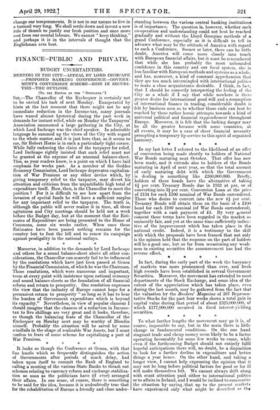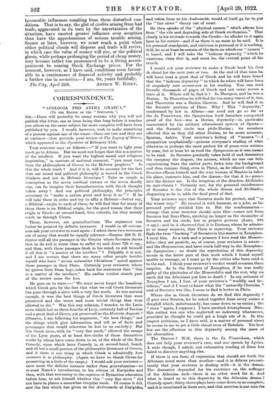FINANCE—PUBLIC AND PRIVATE.
BUDGET UNCERTAINTIES.
MEETING IN THE CITY—APPEAL BY LORD INCHCAPE —PROPOSED BANKING CONFERENCE—GOVERN- MENT'S CONVERSION SCHEME—RISE IN SECURI- TIES—THE OUTLOOK.
[To THE EDITOR Or THE " SPECTATOR."] SIR,—The Chancellor of the Exchequer is certainly not to be envied his task of next Monday. Exasperated by hints at the last moment that there might not be any immediate reduction in the Income-tax, many journals have waxed almost hysterical during the past week in demands for instant relief, while on Monday the Taxpayers' Association summoned a large gathering in the City, at which Lord Inchcape was the chief speaker. In admirable language he summed up the views of the City with regard to the whole matter, and it is just here that, as it seems to me, Sir Robert Horne is in such a particularly tight corner. While fully endorsing the claim of the taxpayer for relief, Lord Inchcape rightly insisted that such relief must not be granted at the expense of an unsound balance-sheet. This, as your readers know, is a point on which I have laid emphasis for weeks past. As a member of the Geddes Economy Commission, Lord Inchcape deprecates capitaliza- tion of War Pensions or any other device which, by giving temporary relief to the taxpayer, may divert his attention and criticism from the unjustifiable high total of expenditure itself. How, then, is the Chancellor to meet the position ? For it is difficult to see how apart from the invasion of special funds he will have a sufficient surplus for any important relief to the taxpayer. The truth is, although the public will never realize it in time, all these agitations and City meetings should be held not a week before the Budget day, but at the moment that the Esti- mates of Expenditure are being presented to the House of Commons, some six weeks earlier. When once these Estimates have been passed nothing remains for the country but to foot the bill and to renew its campaign against prodigality in the national outlays.
* * * * - Moreover, in addition to the demands by Lord Inchcape and others for a sound balance-sheet above all other con- siderations, the Chancellor can scarcely fail to be influenced by the resolutions which have just been passed at Genoa by the Financial Commission, of which he was the Chairman. Those resolutions, which were numerous and important, teem at every point with insistence upon national economy and sound balance-sheets as the foundation of all financial reform and return to prosperity. One resolution expresses the view that the industry of Europe cannot hope for a permanent return to prosperity " so long as it has to bear the burden of Government expenditure which is beyond its capacity." Nevertheless, in view of popular clamour I should imagine that the chances of a reduction in Income- tax to five shillings are very great and it looks, therefore, as though the balancing feats of the Chancellor of the Exchequer on Monday next may be worthy of Blondin himself. Probably the situation will be saved by some windfalls in the shape of realizable War Assets, but I must confess to fears of some scheme for capitalizing a part of War Pensions. - * It looks as though the Conference at Genoa, with that fine hustle which so frequently distinguishes the action of Governments after periods of much delay, had taken upon itself to commit the Bank of England to calling a meeting of the various State Banks to thrash out schemes relating to currency reform and exchange stabiliza- tion so soon as the politicians have (if ever) arranged their affairs. In one sense, of course, there is something to be said for the idea, because it is undoubtedly true that for the rehabilitation of -Europe a friendly and close under- standing between the various central banking institutions is of importance. The question is, however, whether suck co-operation and understanding could not best be reached gradually and without the Lloyd Georgian methods of a grand Conference, especially as it is difficult to tell in advance what may be the attitude of America with regard to such a Conference. Sooner or later, there can be little doubt, America will come more closely into touch with European financial affairs, but it must be remembered that while she has probably the most unbounded confidence in this country and our fiscal system, she is less familiar with European methods and systems as a whole, and has, moreover, a kind of constant apprehension that they are too much intermingled with international politics to make a close acquaintance desirable. I think, in fact, that I should be correctly interpreting the feeling of the City as a whole if I say that while nowhere is there greater desire for international good will and a resumption of international finance in trading, considerable doubt is felt by business men as to whether those ends can best be reached by these rather heroic attempts towards a kind of universal political and financial rapprochement throughout Europe. Moreover, it is felt that the lurking danger may be all the greater because with some countries, at all events, it may be a case of sheer financial necessity prompting a temporary lip-service to this spirit of organized harmony.
* In my last letter I referred to the likelihood of an offer of conversion being made shortly to holders of National War Bonds maturing next October. That offer has now been made, and it extends ends also to holders of the Bonds maturing in April of next year, so that the total amount of early maturing debt with which the Government is dealing is something like £260,000,000. Briefly, holders of these bonds have the alternative of taking 44 per cent. Treasury Bonds due in 1932 at par, or of converting into 34 per cent. Conversion Loan at the price of £134 for each £100 nominal of War Bonds surrendered. Those who desire to convert into the new 44 per cent. Treasury Bonds will obtain them on the basis of a £100 bond for each £100 nominal (of War Bonds surrendered), together with a cash payment of £4. By very general consent these terms have been regarded in the market as eminently fair, and yet at the same time sufficiently indica- tive of the improvement which has taken place in the national credit. Indeed, it is a testimony to the skill with which the proposals have been framed that not only is the opinion held that the response on the part of holders will be a good one, but so far from occasioning any weak- ness in existing securities the announcement has had the reverse effect. * * * * In fact, during the early part of the week the buoyancy of markets was more pronounced than over, and fresh high records have been established in several Government Securities. Moreover, the movement has extended to most departments of the Stock Exchange, and some idea of the extent of the appreciation which has taken place, even during the last month, may be gathered from the fact that the valuation by the Bankers' Magazine of 387 Represen- tative Stocks for the past four weeks shows a total gain in capital value during that period of about £325,000,000, of which £177,000,000 occurred in fixed interest-yielding securities. * * * To what further lengths the movement may go it is,,of course, impossible to say, but in the main there is little change in fundamental conditions. On the one hand stagnant trade and cheap money seem likely to be a factor operating favourably for some few weeks to come, while even if the forthcoming Budget should not entirely fulfil hopeful anticipations there will, no doubt, be a disposition to look for a further decline in expenditure and better things a year hence. On the other hand, and . taking a longer view, I cannot help expressing the opinion that it may not be long before political factors for good or for ill will make themselves felt. We cannot always drift along with scant attention paid either to international politics or to affairs in Ireland, and I would be inclined to summarize the situation by- saying..that up to the present markets have experienced only- what might be described as the favourable • influences, resulting from these disturbed con- ditions. That is to say, thaglut ofcredits arising from had trade, aggravated in its turn by the uncertainties of the situation, have exerted greater influence over securities than have the apprehensions. of serious. trouble arising. Sooner or later, however, we must reach a point when either political clouds will disperse and trade will revive, in which case the value of money will rise, or the political gloom, while perhaps prolonging-the period of cheap money, may become rather too pronounced to be .a fitting accom- paniment to. soaring Stock Exchange prices. For the moment, however, as I have said, conditions seem favour- able to a- continuance of financial activity and. probably a further rise in securities.—I am, Sir, yours faithfully,



































 Previous page
Previous page